3 pet insurance misconceptions you should know
Pet insurance has multiple benefits for both owners and the cats and dogs they love.
In exchange for a monthly premium, owners can get coverage for a variety of medical treatments, prescriptions and some preventative measures. Whether you're a new pet owner or someone with an older animal considering insurance, it makes sense both financially and for peace of mind to get a pet insurance policy.
If you're interested in this form of protection for your pet, speak to a pet insurance expert. They can answer any questions you may have and provide a quote so you know exactly what to expect.
3 pet insurance misconceptions to know
As you embark on the pet insurance hunt, it helps to understand some common misconceptions about this unique form of protection. Here are three you should know.
It's too expensive
This is a common misconception with all insurance types - whether it's life, car or travel. But in reality, the cost of pet insurance is tied to a series of factors. Where your pet falls in those ranges will help determine what you pay.
In general, if your pet is young and healthy you won't have to pay much. Pet insurance costs vary widely, but with most companies, you'll pay around $30-$70 per month for a dog and under $40 monthly for cats.
There are reliable ways to get cheap pet insurance. This ranges from speaking to your vet (to help get a tailored policy in which you only pay for what you need) to obtaining accident-only policies, which tend to be inexpensive.
The best way to get cheaper pet insurance, however, is to shop around for providers. Compare and contrast companies to ensure you're getting the best and most cost-effective policy. Use the table below to get started.
You don't have to pay out of pocket
This is technically true - you don't have to pay out of pocket. But you will pay at the time of the visit. That's because pet insurance doesn't work like health insurance for humans.
With pet insurance, you're responsible for any services your pet received at the time of the visit. So you'll have to tap into savings or charge your card that day. But if you're insured you'll be able to get reimbursed for any money spent. You'll just need to file a claim (the veterinarian won't do it for you). From there your insurance provider will process it and send you the funds you spent back.
In short: You won't ultimately pay for many visits, but you will have to pay the day of so plan accordingly.
You can't get coverage for older animals
This isn't true. You can get pet insurance for older cats and dogs. It just may be more expensive than it would have been if you had signed them up when they were younger.
A variety of pet insurance providers will cover older animals. Pre-existing conditions may not be protected, however. Pet insurance, unlike health insurance for humans, discriminates against those with pre-existing conditions. In fact, your pet may be turned down for insurance coverage if their pre-existing conditions are known, leaving you stuck with multiple bills.
But if your dog or cat is currently healthy, not on any significant medications and isn't being monitored for any future conditions, you should be able to get coverage even if your pet is older. Just consider insurance now while you can still grab a good rate.
The bottom line
Pet insurance is often a cost-effective and reliable way to protect your family pet. Don't be discouraged by myths or half-truths.
And if you're unsure of what kind of protection you can get (or how much it could cost) consider speaking to your vet or a pet insurance expert who can point you in the right direction.




